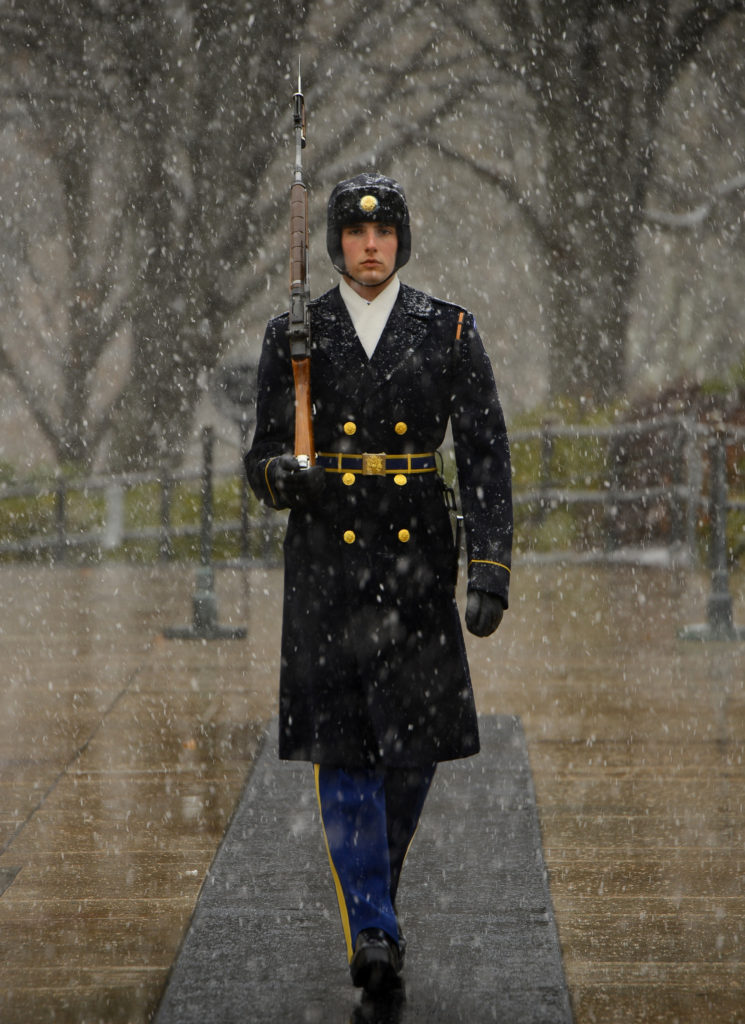
Click-clack. Then, 21 steps. A 21 second wait, a pivot, then click-clack again.
No, not me trying to learn to line-dance.
This is the entrancing, rhythmic walk of the sentinel guarding the Tomb of the Unknown Soldier in the Arlington National Cemetery. It’s a time-honored tradition, and teaching ground, if you know where to look.
And I had the chance to study it over the holiday break.
The click-clack comes from the famed heel clicks as the patrolling soldier pivots after taking paces back and forth in front of the famed tomb.
“Patrolling soldier”, by the way, hardly does these people justice. Tomb Guards are the elite of the elite–the best of the 3rd US Infantry Regiment (“The Old Guard”). They wear the badge of Honor Guard, the rarest badge in the US Army and the second-rarest in the US military (second only to the Astronaut badge).
The 21 steps and 21-second wait before pivoting and repeating is in honor of the military’s highest tribute, the 21-gun salute. It serves as the greatest form of honor and as an unwavering tribute for the unknown soldier it guards, and for all soldiers who gave the ultimate sacrifice for their country.
As I watched the changing of the guard ceremony, I noticed how the silence hung like a blanket over the assembled crowd. The cold, bright, December day was muted in a deafening tone of quiet and utter respect. The dark blue of the soldier’s uniform offered a stark contrast to the bright marble of the tomb and well-kept stone of the plaza.
Click-clack. Then, 21 steps. A 21 second wait, a pivot, then click-clack again.
An unforgettable experience and a powerful reminder of key tenets of leadership–tenets that the Tomb Guards wear as neatly as their impossibly immaculate uniforms.
Here’s what I learned:
- Elite leadership is unswerving commitment
The Tomb Guard have conducted their duty in an unbroken chain since 1926. Day and night, 24/7, 365 days a year, a Tomb Guard paces, protects, and honors the Tomb and all that it stands for.
Hurricane Katrina? Keep marching. 9/11? Keep pacing and protecting.
Unswerving commitment to the cause.
That’s what elite leaders demonstrate.
2. Elite leadership is humility
While a badge emblazoned “Honor Guard” is visible, a name badge isn’t. These soldiers remain nameless, like those they guard. They serve with humility those who served the country.
A role model characteristic for all leaders.
3. Elite leadership is fiercely protecting your charge
At one point I was startled when the Tomb Guard unexpectedly broke his silent marching to loudly bark out a command to a tourist who had let their feet drift under a railing and onto the Tomb plaza. Hardly a DEFCON 1 situation, granted, but that soldier’s charge was utter protection of the Tomb and its surroundings.
Nothing would get anywhere near that Tomb.
You may find yourself in a situation where you must fiercely protect your “charge”, your organization, in one way or another. Do so with the fierceness of the Army elite.
4. Elite leadership is intense pride in serving
The Tomb Guard don’t always stay as such–they rotate back into other Army positions after their “tour of duty” in Arlington. But it’s the highlight of their career, the highest honor that could be bestowed upon them. By all accounts, they relish the opportunity to serve with tremendous pride.
You should too.
5. Elite leadership is adherence to the highest standards
The Tomb Guard strive for perfection. As part of their training they must memorize 35 pages of information on the history of the Tomb and the Cemetery, and recite it without error–including punctuation.
Okay, I can’t even read my name badge upside down without error.
I’m not suggesting this expectation level is right for leaders in the workplace.
It’s about the spirit of it all.
You too can set high standards and make discipline and precision part of your standard operating procedure. Sloppiness in thinking and execution of ideas or ideals have no place in elite leadership.
6. Elite leadership earns, demands, and gives respect
When you see the Tomb Guard, they’ve already earned your respect–that’s a given. But the way they conduct themselves demands respect.
Are you conducting yourself in a manner that unrelentingly commands respect? Are you living to your own standards and values without fail? Do you grant others the respect they deserve, always? That’s the code of elite leaders.
Click-clack.
The echo of the Tomb Guard should resonate with all leaders looking to be the best.




Leave a Reply